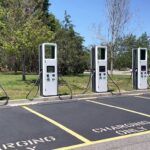Posts in the 'Energy + Climate Change' category
Editor’s Note: This article was updated in September 2022 to present new findings from WRI’s dataset tracking electric school bus adoption in the United States, covering April to June 2022. To the best of our knowledge, these statistics are up to date as ...

As hubs of talent and innovation, American cities are uniquely positioned to fight climate change and improve the health, economy and well-being of their residents. The Biden administration’s Justice40 Initiative and funding available through the Infrastructure Investment and Jobs Act (IIJA) provide rare ...

President Biden suggested that the United States implement a Federal Gas Tax holiday to help consumers weather historically high gas prices. Gas prices doubled in the United States between February 2021 and June 2022, topping out at more than $5 ...

Electric school buses are experiencing rapid growth in the United States, with a nearly 10-fold increase in commitments by school districts and fleet operators in the past year. Thirty-eight states have now committed to procure more than 12,000 electric school buses. In ...

Cities are increasingly trying to discern what post-pandemic resilience will look like, especially in terms of mobility and public transport. And in Colombia, cities are known for their innovations in public transport systems — like Bogotá’s bus rapid transport and ...

As our colleagues have covered previously, there are clear health and environmental benefits to adopting electric school buses instead of their diesel counterparts, which account for more than 90% of the U.S. school bus fleet and result in harmful exhaust ...

Electric vehicles (EVs) are on the rise in the United States. The Biden administration aims for 50% of new light-duty vehicle sales to be zero-emission by 2030. Some states have even more ambitious targets, like California, Massachusetts and New York, which plan to reach 100% new ...

America’s clean energy appetite continues to grow, with more than 180 U.S. cities committed to 100% renewable electricity. While this is promising, more needs to be done to expand the full benefits of clean energy to everyone in these communities. Historically, whiter, ...

As the latest IPCC report notes, cities will play a critical role in climate action over the next decade, and many challenges and opportunities for generating more clean electricity lie ahead. After remaining undaunted in their pursuit of renewables in 2020, U.S. ...

The latest findings from the IPCC paint a grim picture: Despite some signs of progress, the world’s chance of holding global warming to 1.5 degrees C (2.7 degrees F) is shrinking — and with it, our ability to prevent the most dangerous ...

The last decade was defined by commitments to tackle the climate crisis. It began with a slow trickle and ended in a torrent of countries, cities and companies announcing goals to end deforestation, shift away from coal, transition to electric vehicles and ...

A river runs through it, but drought and fire are among the critical threats facing the city of Vitacura, home to 85,000 people on the periphery of Chile’s capital, Santiago. Five years on from a forest fire and regularly recording ...

With every fraction of a degree of global warming, climate change impacts will intensify. In the latest installment of the Intergovernmental Panel on Climate Change’s (IPCC) Sixth Assessment Report, 278 scientists from 65 countries find that the world should peak GHG ...

The newest report from the Intergovernmental Panel on Climate Change (IPCC) paints a troubling picture: Climate change is already impacting every corner of the world, and much more severe impacts are in store if we fail to halve greenhouse gas emissions this ...

India is an emerging economy at the cusp of sizeable growth: over the next three decades, its gross domestic product (GDP) is expected to triple and the population is expected to increase by another 200 million people. As a result, the country is poised ...

Page 3 of 39« First...234...1020...Last »























